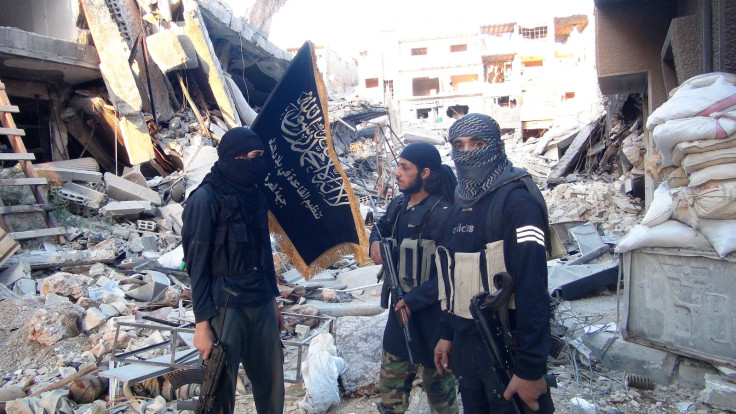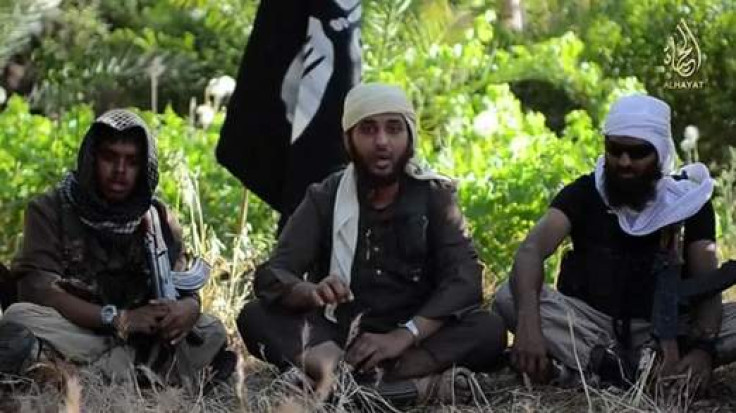When Isis Jihadists Return Home: How to De-radicalise Islamic Extremists
As UK-born Islamic extremists return from Middle East, the de-radicalisation process begins

It starts by unpicking each knot in their ideological tangle. The deradicalisation process for extremist Muslims takes as long as it takes. But it must always involve a benevolent brain washing.
Radicalisation, and the demolition of it, is has become increasingly important since Syria's plunge into civil war and the subsequent emergence of the Islamic State (also known as Isis), which present new threats to the UK's national security.
Drunk on fundamentalist ideology, some British Muslims have travelled to wage jihad (the Arabic word for "struggle" or "resisting", which has come to be associated with terrorist activity) in the Middle East for groups like al-Qaida affiliate Jabhat al-Nusra. The focus at home is now on how to sober them up if they come back – or, preferably, before they have had a chance to leave.
"The key part of deradicalisation is dismantling the narratives and the theological justifications that extremists use to justify their actions," Charlie Winter, a researcher at the anti-extremism thinktank Quilliam Foundation, told IBTimes UK.
"So it's all about drawing out the key points, the key motifs of jihadism and dismantling them from the outside.
"That's why former jihadists themselves are some of the most effective deradicalisers. Because they know the ideology inside out and they know the arguments that will try to be used to defend it."
This is why, despite the risks involved, we should allow jihadists to return from the Middle East to the UK, Winter adds. They are a potentially significant resource in deradicalisation.
Estimates vary, but hundreds of British Muslim are thought to have joined the Islamic State, lured in by the scenes of military adventurism played out across the media, as well as the group's own rampant online propaganda.
Now there are reports of some, having found the taste of violent jihad a little bitter for their palettes, wanting to come home.
But the government has just unveiled plans to tighten the rules around returning fighters. Prime Minister David Cameron is putting legislation through parliament that, if passed, would mean those who have left the UK for the purposes of terrorism will be temporarily barred from re-entry for up to two years.
They will only be able to return if they comply with an investigation, face trial, and agree to home detention. It is not clear if they will also be put forced onto a deradicalisation programme.
Peter Neumann, director of the International Centre for Study of Radicalisation and Political Violence (ICSR) at King's College London, has said that the jihadists he speaks to "want to quit but feel trapped, because all the government is talking about is locking them up for 30 years".
"If you only have a law-and-order message then you risk creating a self-fulfilling prophecy where they simply go to the next battlefront and become really hardened extremists," he said.
Rather, Neumann believes, the British government should consider setting up a deradicalisation program for repentant, less-hardened jihadists, because they could become powerful spokesmen against the Islamic State.
Mandatory deradicalisation?
Channel is one of the UK government's flagship counter-terrorism initiatives. Under Channel, the government works across various organisations – including the police, local communities and social services – to identify individuals at risk, assess the threat they pose and offer them the support they need.
Since its inception in 2007, under the government's wider Prevent counter-terrorism strategy, it has intervened with hundreds of young Muslims at risk of being, or have already been, tempted towards extremism.
"It's important that the main deradicalisation programme Channel is imposed as a mandatory measure on people coming back from Syria and Iraq," Winter said.
"That's very important that they get deradicalised and that they have to, because at the moment it's optional."
Prevent, under which Channel falls, is itself just one part of the over-arching counter-terrorism strategy in the UK, known as Contest.
There are four parts to Contest. Pursue; to stop terrorist attacks. Prevent; to stop people becoming terrorists or supporting terrorism. Protect; to strengthen the UK's protection against a terror attack. And Prepare; to mitigate the impact of a terror attack.
It is Prevent which deals with deradicalisation. But it has come in for heavy criticism since it was first pursued in the wake of the 9/11 terror attack on the US.
Tens of millions of pounds have been spent on the various initiatives falling under the strategy, but their impact is unclear.
Some of its critics have said it alienates Muslim communities because they perceive it as finger pointing. That they are all seen as potential terrorists. Others have said money has gone to the sort of conservative religious groups it should be working against, not with.
There are also calls for more to be done on radicalisation in prisons. Muslims are often targeted by radicalised inmates and, on completing their sentences, emerge into society as extremists with the potential to commit acts of terrorism.
Voluntary deradicalisation programmes are available in prison as well as anti-extremist Imams approved by the government. But these measures, as well as transferring inmates at risk, appear to have little effect.
"What concerns me most is that there is a significant risk, given the fact that we manage some very dangerous people," Michael Spurr, chief executive of the National Offender Management Service, told the BBC News in May 2014.
Counter-narratives
A study by Queen Mary University of London, published in September 2014, linked vulnerability to radicalisation.
Its survey of over 600 men and women of Pakistani, Bangladeshi and Muslim heritage in London and Bradford, aged 18-45, found that those most at risk of radicalisation are more likely to be depressed and socially isolated. It also found that migrants were more resistant to radicalisation than those born in the UK.
Some are lured in by charismatic radical preachers invited to speak at a local mosque. Others are radicalised online, where there is a ready and expanding archive of extremist material, from YouTube sermons by fundamentalists, to websites with literature on bomb-making, to the social media mullahs who use popular networks and forums to groom potential recruits.

Then there are those eyeing adventure, community and power, all attractive prospects to disaffected and lonely Muslim teenagers who feels little, if any, attachment to British society.
The images of the advance of the Islamic State, a theofascist caliphate, can look enthralling to certain eyes. It is particularly effective in its online propaganda, with slick videos and heavy use of social media to spread pictures, information and ideas.
Al-Sakina, an independent, non-governmental organisation created to engage in dialogue online as a way to combat internet radicalisation, claimed that militant Islamic groups are sending 90 tweets a minute.
Much of the Islamic State propaganda shows militants using heavy weaponry or carrying out gruesome executions, often beheadings, under the banner of Sharia law.
"What I do think would be very helpful is if the government encouraged more actively society-led counter-narratives being circulated on the internet, because that is the front line of radicalisation," Quilliam Foundation's Winter said.
"At the moment, jihadists do have a monopoly – or a partial monopoly, at least – on the voice of British Muslims, because they are just very loud.
"They spend a lot more time tweeting and circulating propaganda than people who are opposed to Islamic State. And they're more convincing as well."
Hayat and Aarhus
Other European countries facing the same challenges have already started deradicalisation programmes. In Germany Hayat works with the radicals' families, tapping in to the Quranic teachings that children must listen to their parents.
A Guardian profile of Hayat said it had worked on around 100 cases, helping to stop or slow the radicalisation in 35 of them, some of who chose not to go and fight alongside jihadists in Iraq and Syria.
In August 2014 it was announced that the Home Office would fund a branch of Hayat in London as the government begins to think seriously about utilising deradicalisation as a tool in the fight against extremism, particularly given what is happening around the Islamic State.

Winter said the intervention of friends and family is of very high value to the deradicalisation process.
"What we're seeing happening now in Iraq and Syria is a new phenomenon that's slightly different from past jihadist recruitment of foreign fighters," he said.
"People are being recruited as friends. So groups of people together are going out to fight in Syria. You see networks. Not formal networks, but networks of friendship.
"They all know each other. It's part of a peer group thing. It's not just a charismatic recruiter being involved anymore. Its charismatic recruiters coupled with very effective propaganda coupled with peer pressure.
"In order to dismantle those three fundamentally strong forces, friends and family is imperative in having a role in this. People need to have another option."
In Aarhus, Denmark, there is a deradicalisation programme facing on inclusion in society as a means of deradicalising Muslims who have travelled to war-torn Syria and returned. It works across the social sphere – police, teachers, community groups, social workers – and uses the sharing of information.
In Denmark, returning fighters are not immune from prosecution if they have acted criminally while in Syria. But those returning with a clean conscience are offered support to reintegrate in society, with things like education, employment and housing. Following the programme there has been a sharp reduction in young Muslims leaving the city to go to Syria.
Stop waiting for terrorism to happen
Kamaldeep Bhui, a professor of cultural psychiatry and epidemiology, was the lead author of the Queen Mary University of London radicalisation study.
"As a nation, we spend a great deal of time, effort and money on counter-terrorism – but virtually no attention is given to preventing radicalisation before it has a chance to take hold," he said when his research was released.
"We must change this approach and stop waiting for terrorism to happen before acting."
It is a message echoed by Winter of Quilliam.
"The government needs to really redouble its efforts in developing and restructuring certain aspects of Channel. But also at the same time, Channel is a reactive measure," he said.
"Prevent is also something that needs to have efforts redoubled over, because that is the initiative that is trying to counter extremism before it mutates into violent extremism.
"The government really needs to focus its Prevent strategy on tackling the long-term causes of jihadism instead of just tackling the symptoms of it."
© Copyright IBTimes 2024. All rights reserved.







